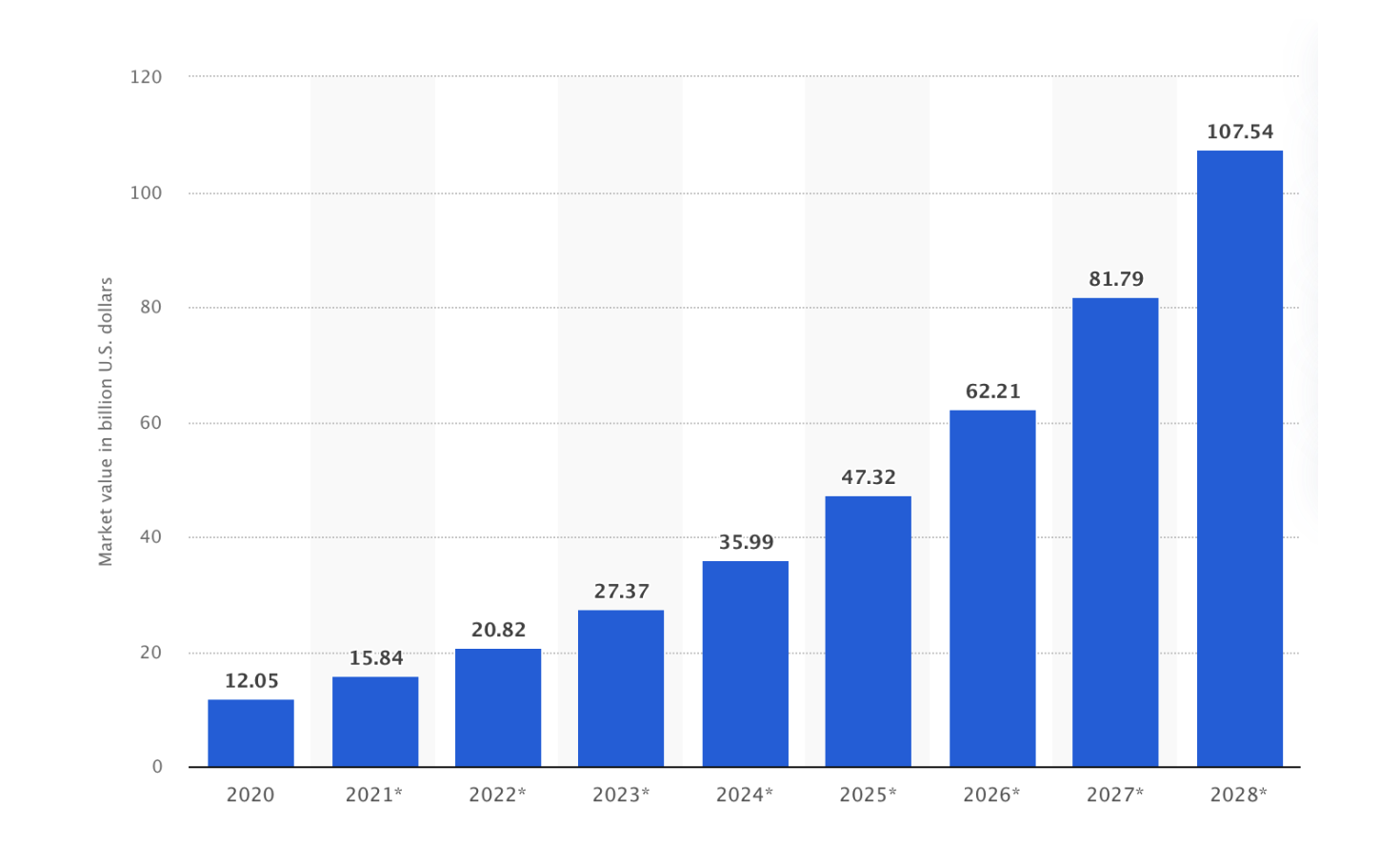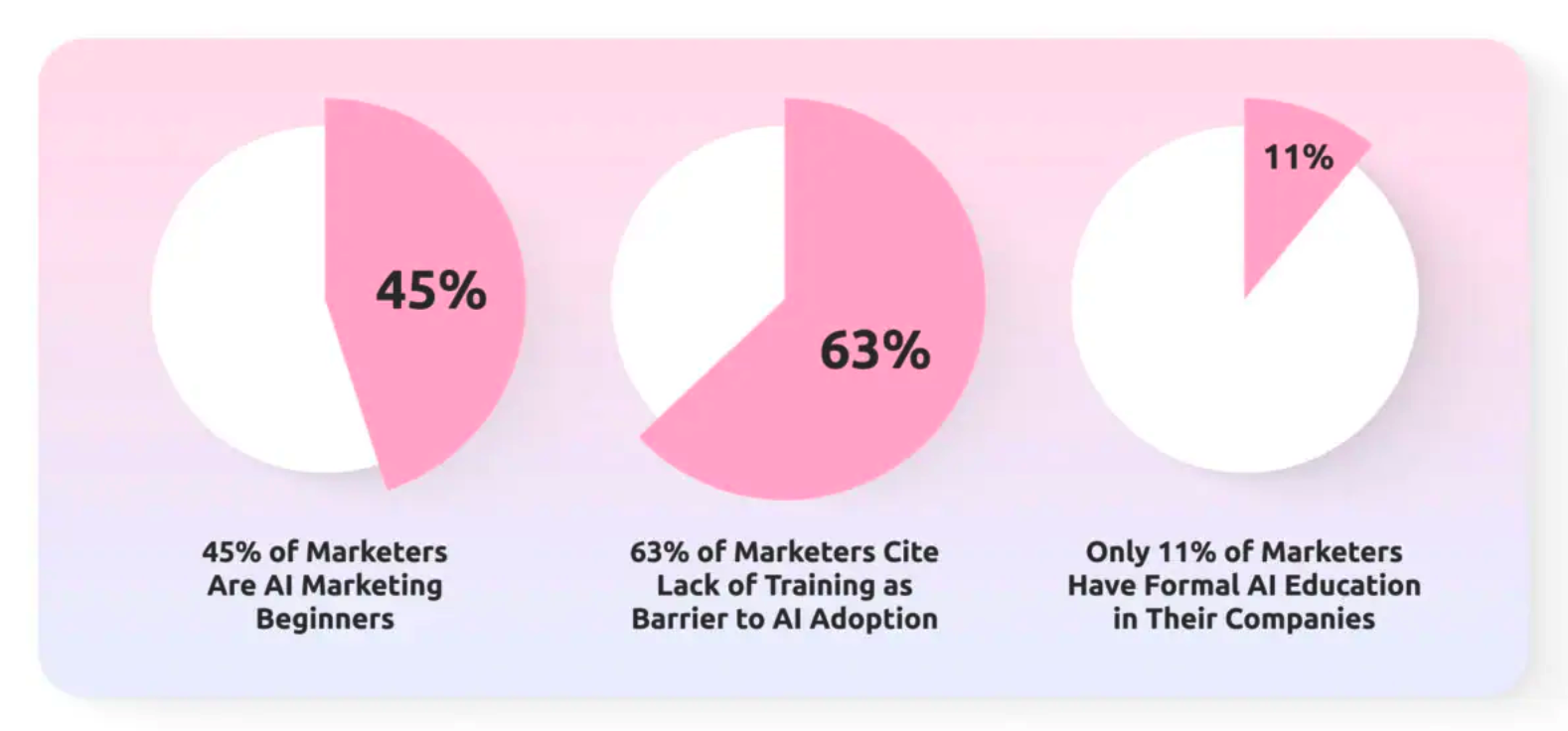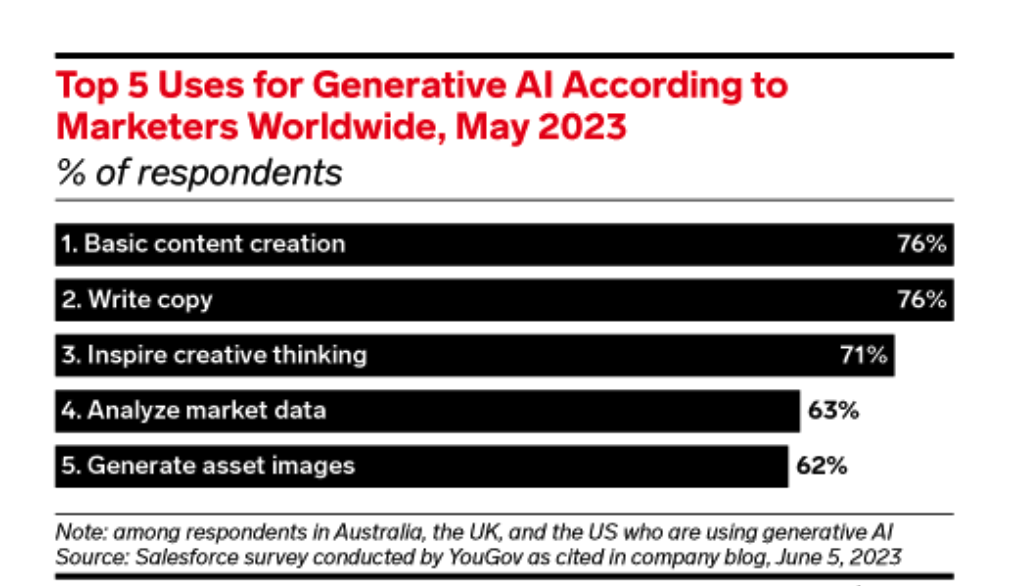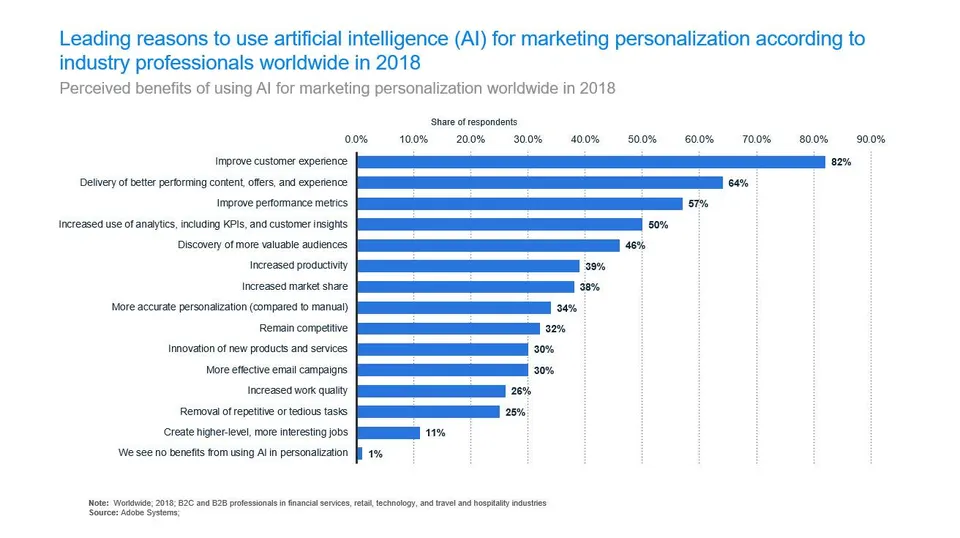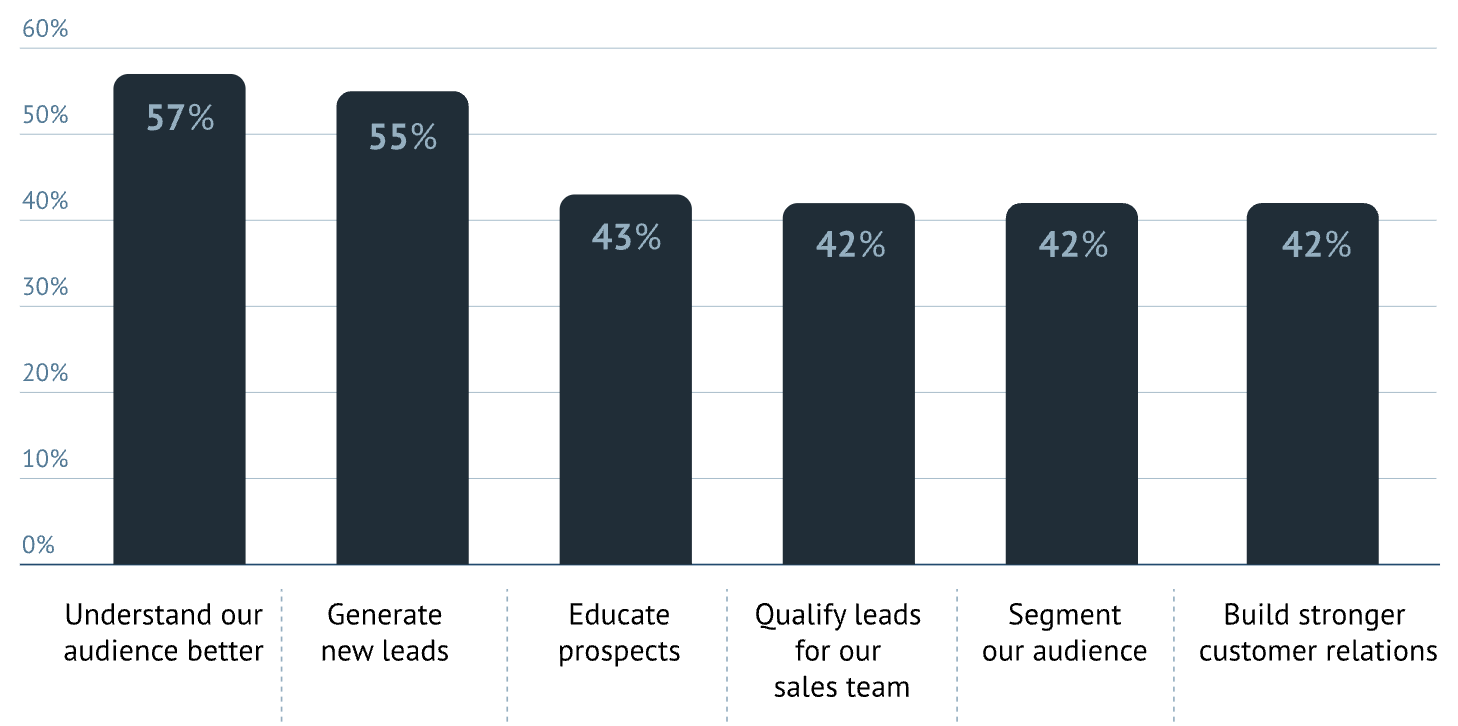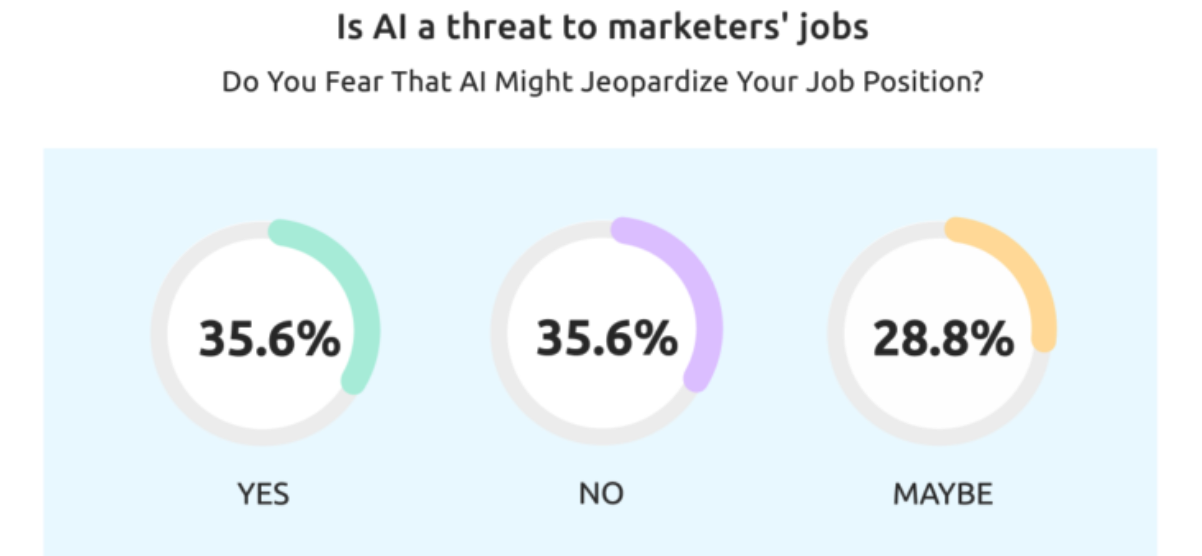67 AI Marketing Statistics 2023 [Adoption, Use Cases, Market Size]
As AI has become more common in a variety of sectors, it is expected to become a major player in digital marketing trends in 2023.
But what is the role of artificial intelligence in marketing? What changes can artificial intelligence actually bring to digital marketing? And how important is artificial intelligence for marketing?
Let’s have a look at the statistics that will help you better grasp the present status of AI in marketing and its future scope as well.
- , AI
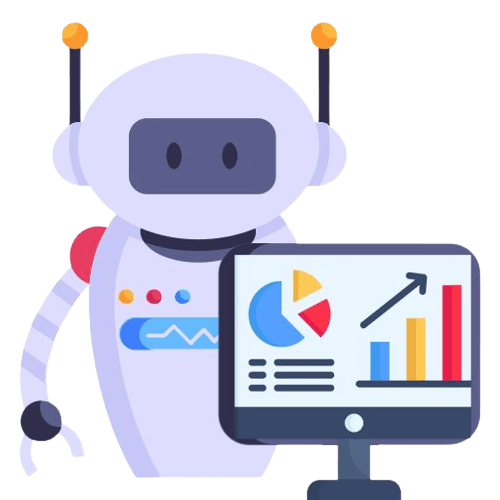
Top AI Marketing Statistics in 2023
Below are our top picks for the most important AI in marketing statistics.
- The present value of the artificial intelligence (AI) industry in marketing is $15.84 billion, and it is expected to exceed $100 billion over the next five years.
- AI is used for marketing purposes by 28% of top companies.
- In 2022, just 15% of content marketers plan to use AI
- Companies that implement AI technologies see a 451% increase in qualified leads.
- According to 84% of digital marketing executives, using AI and ML improves the marketing function’s ability to provide clients with real-time, personalized experiences.
- Within the last four years, there has been a 55% increase in the use of AI in marketing.
- Today, AI is used for content marketing by over 50% of corporate executives.
- AI has been used at firms by 73% of marketing directors.
- AI is one of the technologies that will have an influence on marketing in the future, according to 79% of respondents to the Drift Leadership Study.
- The market for AI in marketing is estimated to be worth more than USD 48.8 billion by the year 2030 and will grow at a CAGR of 28.6%
- The marketing and sales function will be impacted by between $1.4 trillion and $2.6 trillion, according to the McKinsey Global Institute.
- AI technology is used in toolkits by 64% of marketing businesses.
- High-performing marketers claimed to have a fully developed AI strategy in 70% of cases.
- Marketers claim that using AI reduces call time by 70%.
- In order to free up IT staff for more strategic work, 40 percent of infrastructure and operations (I&O) teams at big organizations will utilize AI-augmented automation by 2023.
- Australia experienced an 85% boost in revenue for firms using AI marketing initiatives.
- The attitudes of freelancers towards the use of AI in marketing are likewise divided.
- More than 40% of marketers believe that if AI took over, key activities would remain for people to do.
- According to 81.6% of digital marketers, AI will eventually replace content writers.
- Only 47% of marketers are skeptical about AI-based automated ad targeting.
- AI has the potential to replace 5% of sales force jobs.
- Marketing in the US is adopting generative AI more quickly than any other sector.
- The production of AI will be responsible for 30% of major organizations’ outbound marketing communications.
- 33% of marketers that utilize AI say it generates fresh concepts.
- Almost 80% of marketers are automating at least some aspects of the client experience.
- For the purpose of generating demand, more than half of B2B marketers utilize AI chatbots.
- 52% of successful marketing firms have increased their use of AI.
- The deployment of AI resulted in a 41% boost in revenue and conversions from email marketing.
- In 2022, 22% of the artificial intelligence market will be controlled by the promotional and media industries.
- By 2030, AI marketing will account for 45% of all economic benefits.
- Over 19% of marketing professionals allocate at least 40% of their overall marketing budget to AI.
- By 2027, 74% of marketers will utilize AI for more than 25% of their work.
- Even if they didn’t gather the AI data, marketers are still learning from it.
- The value of Jasper AI is at least $1.5 billion.
- AI might do tasks that now take ten years in only one.
- According to 63% of marketers, the largest obstacle to using AI is a lack of expertise in the field.
- Nearly 90% of marketers think their company has to embrace AI more to better serve consumers and compete.
- Marketers that use automation deem it successful 86% of the time.
- AI solutions were employed by 90% of marketers in 35 different countries to automate consumer interactions.
- According to 88% of marketers that deal with AI, the technology has assisted them in personalizing the client experience across a variety of channels.
- Globally, over eighty percent of online marketers employ some form of artificial intelligence.
- Chatbots were employed in demand generation campaigns by 57% of B2B marketers in the United States to better understand their target market.
- The use of chatbots to create new leads was reported by 55% of B2B marketers in the United States.
- Data analysis using AI is used by 53% of the marketers that were surveyed.
- Chatbots are used by 52% of telecom companies.
- The majority of Americans—nearly 50%—believe that social media postings for commercial reasons cannot utilize Photoshop or generative AI.
- 50% of marketers have integrated AI into their business plans.
- Nearly 50% of marketers expressed worry about the confidentiality of information and the ethics of artificial intelligence.
- In the United States, the United Kingdom, India, and Canada, 47% of marketers stated they preferred AI for ad targeting.
- About 45% of marketing professionals utilize AI to generate content.
- According to 43% of B2B marketers in the US, chatbots helped them inform potential customers.
- In the United States, the United Kingdom, India, and Canada, respondents who worked in marketing said that they trusted AI 42% for real-time personalization of content and offers and 39% for email send-time optimization.
- 35% of marketers are worried about the governance and risk problems associated with the use of AI in marketing.
- ChatGPT is the most frequently mentioned AI tool among our respondents, having been cited by 34.5% of our marketing respondents.
- Time-saving was cited as the main advantage of AI and machine learning by 33% of American marketers who use these solutions.
- 32% of marketers globally use marketing automation and AI to personalize email messages and offers and run paid advertising.
- The technologies aided their understanding of consumer preferences and trend insights, according to 31% of American marketers using AI and machine intelligence.
- 29% of marketing executives want to employ AI in the future.
- According to 26% of American marketers, AI and machine learning helped them optimize their content.
- The lead generation volumes of 26% of B2B marketers in the U.S. who used chatbots in their marketing campaigns grew by 10% to 20%.
- To create personalized email subject lines, product and content suggestions, and marketing automation, 22% of marketing professionals globally utilize AI.
- According to 15% of B2B marketers in the U.S., chatbots helped them generate more leads by over 30%.
- The likelihood that top-performing businesses use AI for marketing is more than twice as high (28% vs. 12%).
- To enhance customers’ purchasing experiences, retailers are spending $5.9 billion this year on AI-based marketing and customer support solutions.
- With 37% of financial services marketers now employing AI applications, they outpace all other sectors in terms of adoption.
- The most common way for sales and marketing teams to cooperate is via the use of AI-based apps such as Configure-Price-Quote (CPQ) and Marketing Automation. Sales executives anticipate that the use of AI will expand by 155% across sales teams in the next two years.
- 21% of sales executives use AI-based tools, with the majority working together with marketing teams to share these tools.
- A total of 22% of marketers now utilise AI-based products, and another 57% aim to use them during the next two years.
Market Size of AI in Marketing
Artificial intelligence (AI) in marketing was predicted to have a 15.84 billion USD industry in 2021. By 2028, the value, according to the estimate, will surpass 107.5 billion (Statista)
Back in 2021, the AI scene in marketing was rocking a hefty price tag of 15.84 billion U.S. dollars. Fast forward to the future, and things were gearing up for an incredible leap. By 2028, experts were laying their bets on that number blasting off to a whopping 107.5 billion.
In 2017, the market for artificial intelligence (AI) in marketing was valued at USD 5.00 Billion, and it is anticipated that it would reach USD 40.09 Billion by 2025, at a CAGR of 29.79% over the forecast period (MarketsandMarkets)
Between 2018 and 2025, it is anticipated that the market for AI applications in marketing will expand at the greatest CAGR in APAC. This expansion may be ascribed to the adoption of AI services in end-user sectors such as retail, BFSI, enterprise, and media and advertising in countries such as Japan, China, Australia, and South Korea. Other nations contributing to this development include the United States of America.
The market for AI in marketing will be worth more than USD 48.8 billion by the year 2030 and will grow at a CAGR of 28.6% (MRFR)
During the new and continuing forecast period of 2021–2028, the worldwide market is anticipating intriguing growth due to the growing momentum of artificial intelligence across many sectors and industry verticals. According to a report by Market Research Future, the market for AI in marketing will reach a value of more than 48.8 billion US dollars by the year 2030 and will grow at a compound annual growth rate of 28.6%.
Adoption of AI in Marketing
Artificial intelligence in marketing has existed for decades, and in recent years, it has become an increasingly prevalent component of marketing operations. But it still has a huge chance to improve marketing procedures and aid in the industry’s rapid development.
These machine learning statistics demonstrate how AI is advancing in marketing as well.
87% of organizations that had used AI were utilizing it to boost email marketing (Leftronic)
According to data on AI adoption, users are attempting to use AI to enhance their email marketing efforts. In terms of percentage, they are now in the upper 80s, but the utilization rate is anticipated to become much higher than that.
AI is currently being used for content marketing by more than half of the CEOs of businesses (SiegeMedia)
In a recent survey, 52% of business executives said that their organization already uses generative AI as part of its content marketing strategy. 64.7% of businesses will have used AI in marketing by the end of 2023.
Artificial intelligence has been implemented in their organizations by 73 percent of marketing professionals (MarTech)
Marketing directors have embraced AI solutions, such as generative AI, in both B2B and B2C businesses. Of those who haven’t used AI yet, 31% plan to within the next year, and 46% within the next two years.
Obstacles to AI Adoption in Marketing
Although the usage of AI has increased recently, there are still issues that prevent its widespread acceptance in the marketing industry. Here are some numbers about the roadblocks to AI marketing:
45% of marketers are AI marketing beginners, with 63% highlighting education and training gaps as the main obstacle to AI adoption, while just 11% have formal AI-focused education within their companies (Influencer Marketing Hub)
AI Novices: A significant 45% of marketers are currently at the beginner stage of AI integration in their strategies.
Training Hindrance: A staggering 63% of marketers point to a lack of training as the primary obstacle to adopting AI for their marketing efforts.
Education Gap: Surprisingly, only 11% of marketers report having access to formal AI education within their companies, highlighting a crucial need for more comprehensive AI learning opportunities.
Where is AI Used in Marketing?
When it comes to marketing, there are a plethora of use cases for deploying AI. Amazon started recommending items to its consumers using “collaborative filtering” in 1998, marking the first time that AI and marketing were merged. Artificial intelligence (AI) applications in different areas of marketing, for example, content marketing, advertising automation, dynamic pricing, etc., are constantly expanding day by day.
Leading industries worldwide in which marketers used marketing automation and artificial intelligence (AI) as of February 2022 (Statista)
In a study of marketers performed in February 2022, 32% of participants claimed to be using marketing automation and artificial intelligence (AI) together for paid advertising as well as for the customization of email messages and offers. When it comes to making suggestions for products and content as well as customizing email subject lines, 22% of respondents blended AI with marketing automation.

|
Categories |
Share of respondents |
|
Paid advertising |
32% |
|
Personalizing email messages/offers |
32% |
|
Product/content recommendations |
22% |
|
Personalizing email subject lines |
22% |
|
Predictive analytics |
18% |
|
Account identification |
18% |
|
Chatbots |
16% |
|
Campaign send/deployment timing |
16% |
|
Segmentation |
12% |
In 2022, just 15% of content marketers plan to use AI more (CMI)
According to the annual B2B Content Marketing Report compiled by CMI (Content Marketing Institute) and MarketingProfs, just 15% of content marketers are planning to increase their use of AI in 2022.
Over 80% of marketers believe that AI is a significant trend in advertising (Leftronic)
According to the most recent study, 82% of marketers agree that artificial intelligence (AI) and machine learning (ML) are key elements that will influence the future of marketing. Additionally, marketers anticipate that the application of artificial intelligence in marketing will enhance the ability to recognize potential clients and boost overall marketing efficiency.
CMOs prioritize AI in personalized content and predictive analytics, with B2B service firms (62.2%) leading in content personalization (Marketing Charts)
The two applications of AI that CMOs now place the most priority on are content personalization and predictive analytics based on consumer data. According to the CMO survey, B2B service firms (62.2%) are the top users of AI for content personalization, while B2B product companies (62.2%) are the top users of AI for both virtual and augmented reality, face recognition, and visual searching.
Leading Applications of Generative AI in Marketing
76% of those marketers who are currently employing generative AI stated that they utilize it for fundamental content generation and to develop copy (Insider Intelligence Inc.)
Of the marketers presently utilizing generative AI, a substantial 76% employ it for fundamental content creation and the development of copy, showcasing its integral role in modern marketing strategies.
| Uses for Generative AI | % of Respondents |
| Basic content creation | 76% |
| Write copy | 76% |
| Inspire creative thinking | 71% |
| Analyze market data | 63% |
| Generate asset images | 62% |
How Does Artificial Intelligence Help in Marketing?
Nevertheless, artificial intelligence (AI) has been steadily making its way deeper into marketing over the last several years, assisting firms in improving every stage of the consumer experience.
But How Does Artificial Intelligence Help in Marketing?
40% of companies cite user experience as their primary motivation for using artificial intelligence (Semrush)
According to a Semrush report on AI in marketing, 40% of organizations cite customer experience as their main reason for utilizing AI. Additionally, research on the use of AI in email marketing indicates improvements in revenue, CTR, and open rates.
As of January 2022, top marketers throughout the globe rely on artificial intelligence (AI) to do a variety of tasks for them (Statista)
In a survey of marketing professionals in the US, UK, India, and Canada, 47% of participants stated they trusted artificial intelligence (AI) to target advertisements.

|
Categories |
Share of Respondents |
|
Target ads |
47% |
|
Personalize content & offers in real time |
42% |
|
Optimize email send time |
39% |
|
Calculate conversion probability |
37% |
|
Optimize email subject line |
33% |
|
Conduct a live chat session |
32% |
|
Score leads |
30% |
|
Write subject lines |
22% |
|
Write copy |
21% |
82% of marketing leaders cite enhancing the customer experience as the primary driving force behind their choice to embrace AI (Statista)
For 82% of marketing leaders, the adoption of AI stems from a paramount goal: elevating the customer experience. This statistic underlines how customer-centricity is steering the AI revolution in marketing.
What Drives Marketers to Utilize AI?
For greater consumer comprehension, 57% of B2B marketers employ AI chatbots (Statista)
According to research conducted by Statista, 57% of business-to-business (B2B) marketers make use of chatbots in order to obtain a more in-depth knowledge of their target demographic. In near succession, utilizing AI chatbots to generate fresh leads (55%), educate potential customers (43%), and assess lead viability (42%) ranks prominently.
| Reasons | % of Respondents |
| Understand the audience better | 57% |
| Generate new leads | 55% |
| Educate prospects | 43% |
| Qualify leads for the sales team | 42% |
| Segment the audience | 42% |
| Build stronger customer relations | 42% |
Benefits of AI in Marketing Statistics
The key advantage marketers emphasize when outlining the advantages of employing AI in marketing is a fantastic user experience. A successful firm must, without a doubt, focus on growing customer satisfaction, which is directly related to rising corporate earnings. However, the advantages of AI extend beyond the consumer end of the spectrum. Businesses that incorporate AI-powered marketing solutions may reap significant advantages in terms of time and money savings, resource optimization, and a focus on one-of-a-kind, innovative tasks.
Incorporating AI into marketing and sales has, according to 79% of respondents, enhanced company revenue (McKinsey)
According to McKinsey’s research on the status of artificial intelligence, 79% of respondents said that incorporating AI into marketing and sales had enhanced corporate revenue. The gain in income differs, but AI-based marketing strategies enable businesses to produce at least 20% more revenue.
One-third of U.S. marketers utilizing AI and machine learning tools have identified time savings as the primary and most impactful advantage of employing these technologies (Statista)
In the realm of U.S. marketers, a noteworthy trend emerges as a significant percentage, specifically 33%, express that the most prominent reward derived from their integration of machine learning and AI marketing tools is the gift of time saved. These innovative technologies have proven adept at streamlining processes, enabling professionals to allocate their precious time more efficiently.
Recommended Reading:
According to 84% of digital marketing executives, utilizing AI and ML improves the marketing function’s potential to provide clients with real-time, personalized experiences (Gartner)
Marketing goals for personalization are intimately related to the use of AI/ML technologies. In fact, according to 84% of digital marketing executives, utilizing AI/ML improves the marketing function’s ability to provide clients with real-time, customized experiences. The biggest advantage of AI/ML solutions, according to many digital marketing experts, is their ability to automate, scale, and optimize marketing efforts across channels.
AI Marketing’s Challenges and Considerations
AI in marketing offers exciting possibilities, but it’s not without its challenges. Balancing personalization with privacy, maintaining a human touch, and preventing biases in algorithms are all hurdles to overcome. Navigating these concerns thoughtfully is key to harnessing AI’s potential in marketing.
An overwhelming majority of digital marketers (81.6%) believe that AI will eventually replace content writers (Authority Hacker)
The use of AI language models may make written text nearly unrecognizable from writing done by humans. It’s hardly surprising that the majority of digital marketers believe AI will someday replace copywriters and content writers since it can significantly speed up the process.
It’s also predicted that professionals who are skilled in using AI for these goals may find themselves in new positions.
According to 63% of marketers, the largest obstacle to using AI is a lack of expertise in the field (Drift – AI Marketing)
Lack of knowledge and training on how to use AI effectively is the only barrier impeding the adoption rate in marketing. More than 60% of those who took the survey said they were hesitant to adopt AI because they didn’t think they understood it well enough.
The fact that 89% of marketers report that their organizations lack an AI training program shouldn’t come as a surprise.
The rising usage of AI is causing 35.6% of marketing professionals to worry that their jobs may be in danger (Influencer Marketing Hub)
A survey of 2,700 marketing professionals revealed that 35.6% of them are worried that the rising use of AI will pose a danger to their careers. However, the same proportion disagrees and says it wouldn’t be, with 28.8% of them being unsure.
Future of Artificial Challenges in Marketing
The worldwide AI industry is predicted to reach $267 billion by the year 2027. This growth isn’t unexpected, considering all the advantages of AI in marketing. With AI-powered solutions, marketing teams will not only be able to automate key cognitive processes. They will also be able to recognize present trends as well as anticipate them for the future, so helping to assure the success of their marketing initiatives.
40% of infrastructure and operations (I&O) teams at big organizations will utilize AI-augmented automation by 2023 (Gartner)
Popular AI developments include augmented intelligence. The term “augmented intelligence” describes the employment of humans and robots to improve cognitive performance. In order to free up IT staff for more strategic work, by 2023, AI-augmented automation will be used by 40% of infrastructure and operations (I&O) teams at big companies.
Companies that have adopted AI will be 10 times more effective and hold twice as much of the market by 2025 as those that have not (Genpact)
Companies must be aware that a tipping moment for AI is approaching. Slow progress will soon accelerate and become spectacular. By 2025, businesses that have used AI will be ten times more efficient and will have double the market share of those that have not.
By 2025, the market for AI software—which includes NLP applications and robotic process automation—will be worth about $126 billion (Statista)
The market for AI software is expected to reach $126 billion by 2025, growing at a fast rate. This rise is spurred by the rising use of robotic process automation (RPA) and natural language processing (NLP) tools, which streamline repetitive operations and enable advanced language interactions. The market for AI software is growing as a result of these technologies’ ability to reshape sectors and increase productivity.
AI Marketing Statistics Final Words
As we stride into the heart of 2023, AI is emerging as a dynamic force in marketing, redefining the landscape. From its pivotal role in content creation to its potential for elevating customer experiences, AI’s influence is unmistakable. Yet, challenges persist, including the need for more education, with a significant number of marketers still considering themselves novices. Anticipating the road ahead, AI’s economic impact is projected to surge, promising exciting transformations that will shape the future of marketing.
References
- Gartner Predicts The Future Of AI Technologies. Gartner. (2019). Retrieved 2 September 2022, from https://www.gartner.com/smarterwithgartner/gartner-predicts-the-future-of-ai-technologies.
- Stefanski, R. (2022). 8 Ways AI Will Change the Future of Marketing in 2022 | Engati. Engati. Retrieved 2 September 2022, from https://www.engati.com/blog/8-ways-ai-will-change-the-future-of-marketing.
- AI in Marketing Market To Surpass USD 48.8 Billion by 2030 Growing at a CAGR of 28.6% – Report by Market Research Future (MRFR). GlobeNewswire News Room. (2022). Retrieved 2 September 2022, from https://www.globenewswire.com/news-release/2022/08/08/2494086/0/en/AI-in-Marketing-Market-To-Surpass-USD-48-8-Billion-by-2030-Growing-at-a-CAGR-of-28-6-Report-by-Market-Research-Future-MRFR.html.
- Top activities marketers trust AI to do worldwide 2022 | Statista. Statista. (2022). Retrieved 2 September 2022, from https://www.statista.com/statistics/1304112/activities-marketers-trust-artificial-intelligence-to-do-world/.
- Conn, S. (2021). Gartner Says 63% of Digital Marketing Leaders Still Struggle with Personalization, Yet Only 17% Use AI and Machine Learning Across the Function. Gartner. Retrieved 2 September 2022, from https://www.gartner.com/en/newsroom/press-releases/-gartner-says-63–of-digital-marketing-leaders-still-struggle-wi.
- Contentmarketinginstitute.com. (2022). Retrieved 2 September 2022, from https://contentmarketinginstitute.com/wp-content/uploads/2021/10/B2B_2022_Research.pdf.
- Marko, M. (2019). 27 Artificial Intelligence Statistics: What’s New in 2022?. Leftronic.com. Retrieved 2 September 2022, from https://leftronic.com/blog/artificial-intelligence-statistics/.
- AI 360: Accelerating AI in the enterprise | Point of view | Genpact. Genpact. Retrieved 2 September 2022, from https://www.genpact.com/insight/ai-360-accelerating-ai-in-the-enterprise
- 7th State of Marketing Report. Salesforce.com. Retrieved 2 September 2022, from https://www.salesforce.com/ap/form/conf/state-of-marketing/?leadcreated=true&redirect=true&chapter=&d=70130000000sUVq&player=&nc=7013y000002hMwTAAU&videoId=&playlistId=.
- Artificial Intelligence in Marketing Market by Technology Machine Learning, Context-Aware Computing – 2025 | MarketsandMarkets. Marketsandmarkets.com. Retrieved 2 September 2022, from https://www.marketsandmarkets.com/Market-Reports/artificial-intelligence-in-marketing-market-3175268.html.
- Why use marketing automation for your business?. Salesforce.com. Retrieved 2 September 2022, from https://www.salesforce.com/in/products/marketing-cloud/benefits-of-marketing-automation/.
- Top areas combining AI & marketing automation 2022 | Statista. Statista. (2022). Retrieved 2 September 2022, from https://www.statista.com/statistics/1303223/top-areas-artificial-intelligence-marketing-automation/.
- Dillard, T. (2022). How AI Helps Marketing in 2022 – InData Labs. InData Labs. Retrieved 2 September 2022, from https://indatalabs.com/blog/ai-helps-marketing.
- AI and ML marketing benefits for U.S. companies 2022. (2023, May 2). Statista. https://www.statista.com/statistics/1364767/ai-ml-usage-company-benefits-us/
- Global AI software market size 2018-2025. (2022, July 27). Statista. https://www.statista.com/statistics/607716/worldwide-artificial-intelligence-market-revenues/
- Timm, D. (2023, March 21). 39 AI Writing Statistics in 2023 — What Content Marketers Need To Know. Siege Media. https://www.siegemedia.com/strategy/ai-writing-statistics
- Hoffman, C. V. (2023, May 8). 73% of marketers now using generative AI tools. MarTech. https://martech.org/73-of-marketers-now-using-generative-ai-tools/
- Carpena, M. (2023, May 31). 40+ artificial intelligence statistics for marketers in 2023. WebFX. https://www.webfx.com/blog/marketing/ai-statistics/
- Dencheva, V. (2023, January 6). Global AI in marketing revenue 2028. Statista. https://www.statista.com/statistics/1293758/ai-marketing-revenue-worldwide/
- 2022 state of marketing and sales AI report. (2023, May 5). Drift. https://www.drift.com/books-reports/state-of-marketing-ai/
- Warren-Payne, A. (2019, March 14). CMOs’ top uses for AI: Personalization and predictive analytics. Marketing Charts. https://www.marketingcharts.com/customer-centric/analytics-automated-and-martech-107714
- Columbus, L. (2019, July 7). 10 Charts That Will Change Your Perspective Of AI In Marketing. Forbes. https://www.forbes.com/sites/louiscolumbus/2019/07/07/10-charts-that-will-change-your-perspective-of-ai-in-marketing/?sh=713a84fe2d03
- Navarro, J. G. (2023, January 6). Benefits of using AI for marketing personalization worldwide 2018 L statistic. Statista. https://www.statista.com/statistics/915493/benefits-using-artificial-intelligence-marketing-personalization/
- Lebow, S. (2023, August 4). 5 charts showing how marketers are thinking about generative AI now that the hype has passed. Insider Intelligence. https://www.insiderintelligence.com/content/5-charts-showing-how-marketers-thinking-about-generative-ai-now-that-hype-has-passed
Patryk Miszczak


